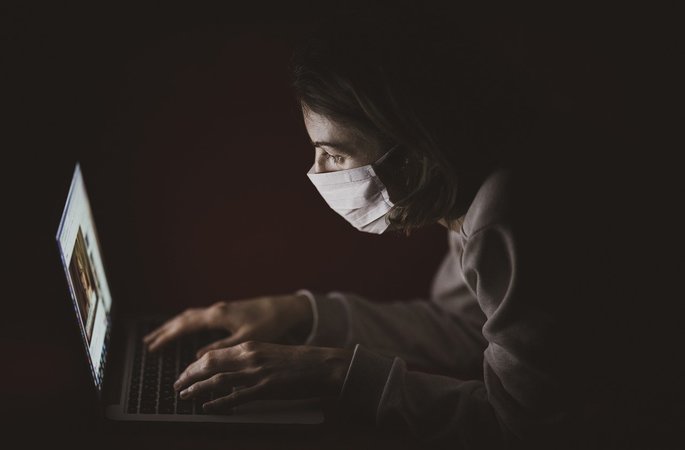As I boarded the flight from Sydney to Los Angeles just over two weeks ago, I wasn’t without my niggling doubts. COVID-19 had infested local and global headlines as insidiously as our collective consciousness.
For over a year, I had anticipated this trip to represent my publisher, Salmon Poetry, at the biggest literary event in North America. Despite the clamouring media banners, the organisers had verified it was going ahead as planned. Flight and hotel bookings had been confirmed months earlier. I had bust a gut organising for my absence – flogged myself to finish editing jobs, left detailed instructions and diary notes, pre-packed my son’s bag for school camp the following week, kissed my slightly trepidatious husband, bear-hugged my sons for much longer than they were comfortable with and reassured our crestfallen dog that I would be back soon.
I switched to aeroplane mode and settled into my sardine-tin seat, convinced I had every detail in hand. But a lot can happen while you are offline for fifteen hours.
Exiting the tightly packed plane – bumping and jostling with business travellers, retired holidaymakers and excited families headed for Disneyland – I reconnected my phone to the outside world.
The early warning signals started to descend… the rapid-fire ding of notifications from every app – a small avalanche of cancellations from exhibitors at the bookfair, emails about speaker withdrawals from panels I was to attend, regret messages from fellow writers I was to meet. On a tight connection to San Antonio, Texas, I ploughed ahead into the sea of unwashed humankind merging from international flights into the US Customs and Border Protection clearance area.
By now, I was feeling every single one of the twelve thousand kilometres between me and my sleeping husband and children.
For the next ninety minutes, I slowly shuffled forward cheek-by-jowl with what seemed like thousands of overseas arrivals. On my phone, I read about two school closures due to COVID-19 not far from our home in Sydney as I snaked over and back through the taped-off channels of a massive hall entirely devoid of hand-sanitising facilities.
As South Korea declared war on coronavirus and WHO experts landed in Iran with six tonnes of medical supplies, I reached the top of the queue. On a touch-screen smudged by the multitudes of tired travellers before me, I tapped out answers to the requisite questions about my visit, input my pre-screened visa number, shoved each hand into a crevice where – with fingers pressed to a greasy screen – after many failed attempts, my fingerprints were captured.
While world markets see-sawed, I was funnelled through further queues to a smiling agent who repeated the entire verification process before welcoming me to America. Racing towards the baggage hall, I ripped another antibacterial hand wipe from my bag and applied sanitising spray for good measure. Like every other traveller confined in that immense press of humanity, by now I had whiplash from auto reacting to every cough and sneeze in my vicinity.
Bag rechecked for the connecting flight, as the Australian Prime Minister warned citizens against panic buying, I opted to run the distance between the international and domestic terminals in lieu of boarding a cattle-crush shuttle bus.
In the few minutes remaining before boarding, I managed to confirm the sessions I was speaking at were still going ahead. There was also a side-trip to a university which had placed one of my books on the curriculum – amongst the tsunami of alerts was an email verifying arrangements for my speaking events there. A quick update text to my husband and I was winging my way to San Antonio, Texas, oblivious to the escalating virus outbreaks in Washington State and New York.
The next few days were a blur of readings, panels, books signings, feverish hand-washing and many happy elbow-bumping encounters with the writers and publishers who had taken the leap of faith to attend. While New York city declared a state of emergency and 1,000 passengers were stranded on a cruise ship off California, we languished in a strange bubble of disconnected camaraderie. All the while, my heart was telling me I should be turning for home.
As the carpets were pulled up and the exhibition stands torn down in Texas, northern Italy went into virus-induced lockdown.
A worried call with my 82-year-old father holidaying in the Canary Islands added to my own international concerns. As I packed for the flights that would take me to my final destination in Missouri before returning home, 59 US colleges announced immediate closures in the face of COVID-19.
As I boarded the first flight, I was steadfastly ignoring the rising internal alarm telling me I was getting further and further from my family. The university I was reading at remained open. My events went ahead – the students were brightly engaged and my hosts overwhelmingly hospitable – welcome distractions from the steady beacon of anxiety I was feeling.
As I packed again for the two flights that would take me home to Sydney, the whole of Italy went into lock-down and the US announced sweeping new travel restrictions. The internal alarm pulse quickened. I fake-cheerfully chatted by phone with my son as he set off for school camp in Sydney. In a follow-up call, I again warned my father to self-isolate in the Canaries while awaiting his flight home to Ireland in early April. I know he was thinking the same thing as me… Please just let me get home safely.
Alongside a screen broadcasting border closures around the globe, I nervously fingered my boarding pass while updating my concerned husband by text. Airline staff announced there would be no stand-bys or extra baggage – the flight was completely full.
I took my window seat and smiled as the woman next to me settled in for the trip to Los Angeles. I wiped my touchscreen and arm-rests. You couldn’t be too careful these days. She adjusted her face-mask, tied her seat-belt and plumped her cushion as I nose-dived into a book. It took me ten minutes to realise how sick she was. The rest of the four-and-a-half hour flight was an anxious blur as I tried to block out the constant wracking coughing.
I faced out the window for four hours as she hocked thick green phlegm into a sick bag next to me. There had been no checks on passengers boarding.
I worried for the pregnant Mum directly in front of us with her two young children, the elderly couple to the side. On a packed plane, like me, they were wedged in with no escape. All I could think was Please just let me get home.
Another landslide of emails and alerts as I flicked back online in LAX – amongst them a message from my hosts that the university I’d read at was closing due to COVID-19. Disneyland had also shut up shop according to my newsfeed. My sons’ school app peppered me with event cancellations. A further race through crowded terminals, border control and security, praying I would still be allowed to fly to Australia. A relieved text to my husband to say I was on board and I settled in for fifteen hours on a two-thirds full plane, alert to every cough and sniffle around me. I arrived into a familiar press of people crowding around touchscreens to pass border control in Sydney – no checks, no barriers, just waves of international arrivals scrabbling to land. In the backseat of a taxi half an hour later, I texted my husband: Almost home!
Forty-eight hours after I opened our front door to an empty house – everyone at work, school or camp – except for one very excited dog, the Prime Minister announced a compulsory 14-day quarantine for all incoming passengers to Australia. I had already voluntarily self-isolated.
I don’t know if that very sick woman next to me on the plane to LA had COVID-19. I know she was probably just trying to make it home to her family, And I wonder what I would have done in her situation. But right now I’m not willing to gamble on anyone else’s safety.
Experts say the incubation period for COVID-19 is five days. Today is the fifth day since I shared that flight from hell with the very sick woman. I have no symptoms. A few minutes ago, a text arrived from my sister-in-law confirming that my Dad’s evacuation flight had landed in Ireland. I choke back tears as I watch our Prime Minister announcing a six-month ban on all international travel from Australia.
Nobody knows what the next six months will bring. Everyone is rightly focused on ‘flattening the curve’. But what happens when you have two ‘homes’ – the country you came from and the one you live in?
Tears well as the reality sinks in… we won’t now be able to return to Ireland this summer to see our parents – our children’s grandparents, all in their eighties and with health conditions – our brothers, sister, cousins, friends. As we bunker down to navigate as best we can through this latest crisis, I realise that, like so many others, I am once again on the wrong side of an international border from family.
This article was first published under the title ‘When coronavirus strikes and you are half a world from home’ in The Irish Times Magazine, the weekend supplement in Ireland’s leading national daily newspaper on 21 March 2020.



